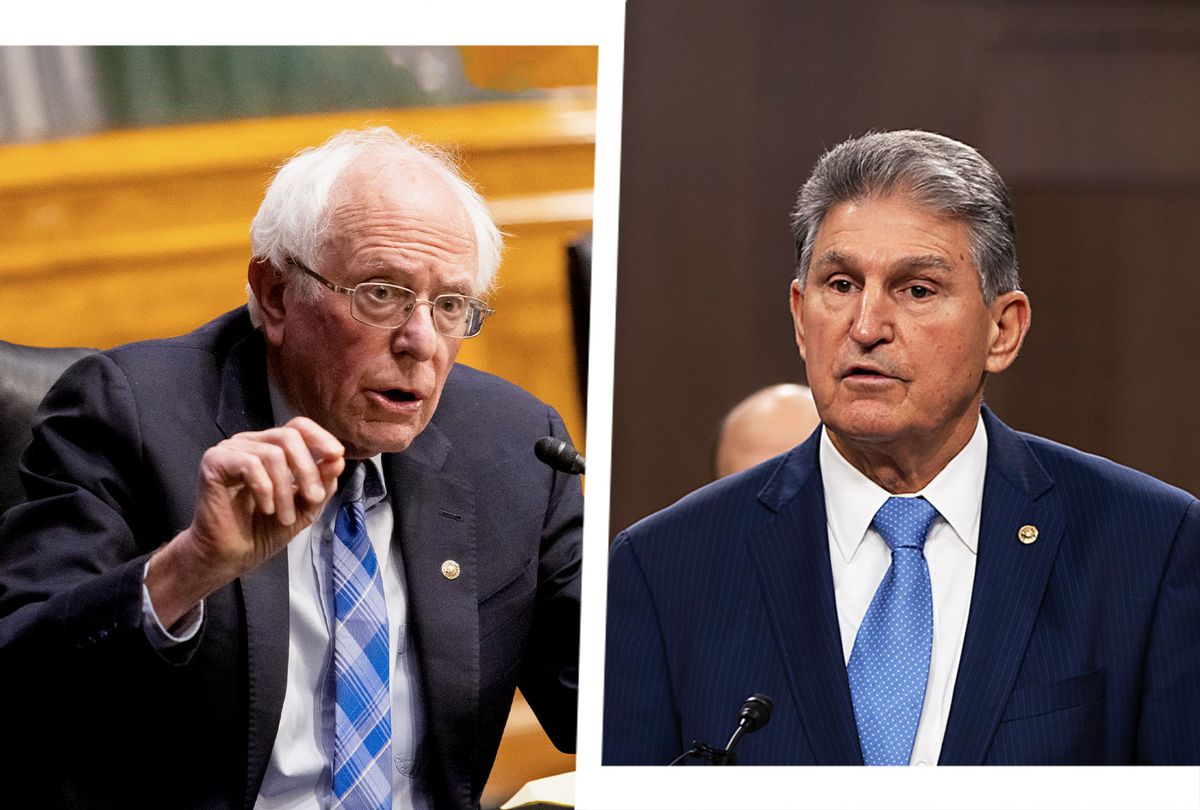Sen. Bernie Sanders, I-Vt., urged Democrats to pressure Sen. Joe Manchin, D-W.Va., to back President Joe Biden's policy proposals after the conservative Democrat — who has embraced his newfound role as a crucial fulcrum in the Senate — opposed a federal minimum wage increase to $15 and an increase to the corporate tax rate to pay for infrastructure investments.
Sanders told MSNBC's Mehdi Hasan on Sunday that Democrats have done a lot of work "internally in terms of bringing the Democratic caucus together," but acknowledged that so-called moderates like Manchin pose a roadblock to some of Biden's most ambitious reforms.
"I have no problem with going to West Virginia, and I think we need a grassroots movement that makes it clear to Joe Manchin and everybody else in the United States Senate, including Republicans, that the progressive agenda is what the American people want," Sanders said. "They want to raise that minimum wage to $15 an hour. They believe that health care is a human right, should be universal. They demand that the rich start paying their fair share of taxes."
Manchin was one of seven Democratic senators to oppose raising the minimum wage to $15 per hour after Biden included the proposal in his coronavirus relief package.
"I think that every Republican wants to raise the minimum wage. Everyone's just not in sync with Bernie Sanders at $15," Manchin told CNN in March, even though that figure was backed by the White House and most establishment Democrats, not just the Sanders "progressive" wing of the party.
Manchin, who has also ruled out scrapping the filibuster to pass voting rights reform, on Monday vowed to oppose Biden's proposed corporate tax hike in the ongoing infrastructure negotiations. The West Virginia senator, who in 2012 backed lowering the previous corporate tax rate from 35% to 28%, argued that Biden's proposal to raise the current corporate tax rate from 21% to 28% was too much.
"As the bill exists today, it needs to be changed," Manchin told West Virginia's Metro News, arguing that the corporate rate should not be raised above 25%.
"There's six or seven other Democrats who feel very strongly about this. We have to be competitive, and we're not going to throw caution to the wind," he said, adding, "If I don't vote to get on it, it's not going anywhere."
The White House earlier tried to rally West Virginia voters to pressure Manchin to vote for Biden's coronavirus relief package, deploying Vice President Kamala Harris in January to warn local news outlets of the economic calamity facing the state's poorest residents without additional aid. The move infuriated Manchin, who reportedly "conveyed his displeasure privately" to senior White House officials before lashing out at Harris publicly for not "working together" with him on a "bipartisan pathway." Manchin ultimately supported the package after leaders scrapped the $15 minimum wage increase, lowered weekly unemployment benefits in the bill, and lowered the income cap for stimulus checks.
Manchin has enjoyed an outsized role in the 50-50 Senate where Democrats cannot afford to lose a single vote, even when they employ the budget reconciliation process to pass legislation with a simple majority to avoid a Republican filibuster. The longtime West Virginia lawmaker has also scoffed at attempts by the party to pressure him; he has continued to win re-election despite the state's Republican lean, and faces little threat in a primary challenge from the left.
"What are they going to do … go into West Virginia and campaign against me?" he said in an interview with The New York Times last month. "Please, that would help me more than anything."
But White House officials have questioned Manchin's motivations, noting to the Times that his main concern in coronavirus relief negotiations was not to direct additional money to his state, which is one of the poorest in the country, but rather to reduce the amount of overall spending in the legislation and consider Republican input — even though not a single GOP senator voted for the bill.
Manchin has wielded his newfound power after Democrats secured the slimmest of Senate majorities in January, arguing that the party would not even be in a position to pass legislation if he were not the 50th vote.
"I know one thing, Chuck, you wouldn't have this problem at all if I wasn't here," he told Senate Majority Leader Chuck Schumer, D-N.Y., according to the Times.
Manchin's insistence on working to find Republican support for legislation, and his opposition to scrapping the 60-vote threshold to end a filibuster, puts him and fellow filibuster supporters like Sen. Kyrsten Sinema, D-Ariz., on a collision course with Democratic leaders, who are dead set on passing voting rights protections in the face of an unprecedented push by Republican state lawmakers across the country to pass stringent new voter restriction laws in response to baseless claims of election fraud by former President Donald Trump and his allies.
"We've got 50 Democrats, [Georgia Sens. Raphael] Warnock and [Jon] Ossoff are two. Since when did Sinema and Manchin get to be more important than Ossoff and Warnock?" Rep. Jim Clyburn, D-S.C., the No. 3 Democrat in the House, told Politico last month, noting that it was the two Georgia senators' wins in runoff elections that got the party to 50 votes and rejecting the idea that the caucus will "do what Manchin says."
Clyburn warned that the party would not allow voting rights to be filibustered "to death."
"There's no way under the sun that in 2021 that we are going to allow the filibuster to be used to deny voting rights. That just ain't gonna happen. That would be catastrophic," he told The Guardian. "If Manchin and Sinema enjoy being in the majority, they had better figure out a way to get around the filibuster when it comes to voting and civil rights."

Shares